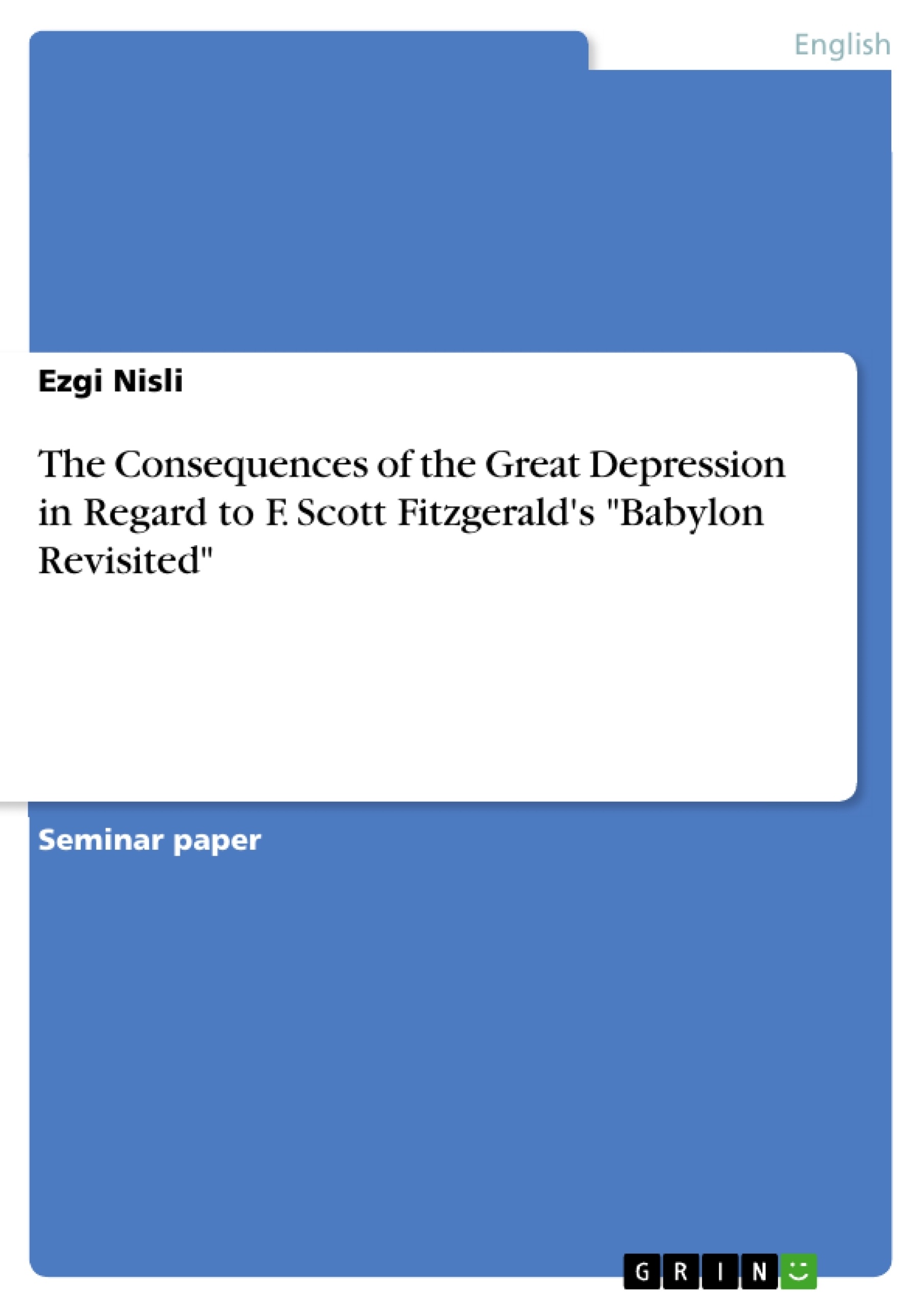“Stocks rise and fall, people load or work, but they go on forever.” This quotation is from American author, F. Scott Fitzgerald’s short story “Babylon Revisited”, which was published in 1931. The short story includes expatriate themes of the early 20th century in Paris that shapes the story of Charlie Wales, a businessman who had a lavish lifestyle before he lost his family and wealth after the crash. The Great Depression that came along with the crash changed the lives of wealthy Americans for the worse, who lived in splendour in Paris before.
This term paper will analyze the consequences of the Great Depression shown in “Babylon Revisited” and how life, on the contrary, was in the Roaring Twenties. As the quotation above explains, everything, such as the stocks and the people go on forever and so does Charlie Wales.
Table of Contents
- Introduction
- Paris in the Roaring Twenties as to "Babylon Revisited"
- Consequences of the Great Depression
- Conclusion
Objectives and Key Themes
This paper analyzes F. Scott Fitzgerald's "Babylon Revisited," exploring the consequences of the Great Depression on the lives of wealthy Americans who had previously enjoyed lavish lifestyles in 1920s Paris. It contrasts the exuberance of the Roaring Twenties with the sobering realities of the Depression era.
- The contrast between the Roaring Twenties and the Great Depression
- The impact of the stock market crash on the lives of wealthy Americans
- Themes of loss, regret, and the search for redemption
- The portrayal of expatriate life in 1920s Paris
- The role of alcohol and excess in shaping character and events
Chapter Summaries
Introduction: The introduction sets the stage by quoting Fitzgerald's observation on the enduring nature of life despite economic fluctuations. It introduces the short story "Babylon Revisited" and its protagonist, Charlie Wales, whose life dramatically shifts from wealth and excess to hardship following the 1929 stock market crash. The paper's aim is to analyze the consequences of the Great Depression as depicted in the story, contrasting it with the Roaring Twenties.
Paris in the Roaring Twenties as to "Babylon Revisited": This section examines the backdrop of 1920s Paris, a haven for wealthy Americans seeking freedom and excitement. It uses the Ritz bar as a central symbol, contrasting its former vibrancy with its current stillness, reflecting the change in fortune for many Americans. The chapter delves into the lavish lifestyles of these expatriates, their excessive consumption of alcohol and engagement in reckless behavior, highlighting the stark contrast with the realities of the Great Depression that would soon follow. The carefree attitudes and amoral behavior of characters like Charlie and Lorraine, as seen through flashbacks, emphasize the stark changes brought about by the economic downturn and the shift in the social atmosphere of Paris. Their seemingly childish behavior is attributed to the reckless abandon afforded by their wealth.
Keywords
F. Scott Fitzgerald, Babylon Revisited, Great Depression, Roaring Twenties, expatriates, Paris, wealth, loss, redemption, alcohol, excess, stock market crash.
F. Scott Fitzgerald's "Babylon Revisited": A Comprehensive Language Preview - FAQ
What is this document?
This document provides a comprehensive language preview of an academic analysis of F. Scott Fitzgerald's short story, "Babylon Revisited." It includes a table of contents, objectives and key themes, chapter summaries, and keywords.
What are the key themes explored in the analysis of "Babylon Revisited"?
The analysis explores the contrast between the exuberance of the Roaring Twenties and the sobering realities of the Great Depression, focusing on its impact on wealthy Americans. Key themes include the loss of wealth, regret, the search for redemption, expatriate life in 1920s Paris, and the role of alcohol and excess in shaping character and events.
What is the focus of the analysis regarding the Roaring Twenties and the Great Depression?
The analysis contrasts the lavish lifestyles and reckless behavior of wealthy American expatriates in 1920s Paris with the hardship and economic ruin brought about by the 1929 stock market crash and the subsequent Great Depression. It examines how this shift in fortune impacted the characters and their perspectives.
What is the role of Paris in the analysis?
1920s Paris serves as a crucial backdrop, representing a haven of freedom and excitement for wealthy Americans before the crash. The analysis uses locations like the Ritz bar to symbolize the change in fortune and social atmosphere experienced by these expatriates.
What are the main chapters covered in the analysis?
The analysis is structured into an introduction, a section detailing Paris in the Roaring Twenties, a section on the consequences of the Great Depression, and a conclusion. Each section focuses on different aspects of the story and its themes.
Who is the main character in "Babylon Revisited," and what is their significance to the analysis?
The main character is Charlie Wales, whose life dramatically shifts from wealth and excess to hardship following the 1929 stock market crash. His experiences serve as a central example of the consequences of the Great Depression on the wealthy.
What are the keywords associated with this analysis?
The keywords include F. Scott Fitzgerald, Babylon Revisited, Great Depression, Roaring Twenties, expatriates, Paris, wealth, loss, redemption, alcohol, excess, and stock market crash.
What is the overall objective of this academic analysis?
The analysis aims to analyze the consequences of the Great Depression as depicted in F. Scott Fitzgerald's "Babylon Revisited," specifically exploring the contrast between the pre-crash era of excess and the subsequent period of hardship and loss.
What is the intended use of this document?
This document is intended for academic use, supporting the analysis of themes in a structured and professional manner. The data contained within is from OCR and is for academic use only.
- Quote paper
- Ezgi Nisli (Author), 2014, The Consequences of the Great Depression in Regard to F. Scott Fitzgerald's "Babylon Revisited", Munich, GRIN Verlag, https://www.grin.com/document/418514



